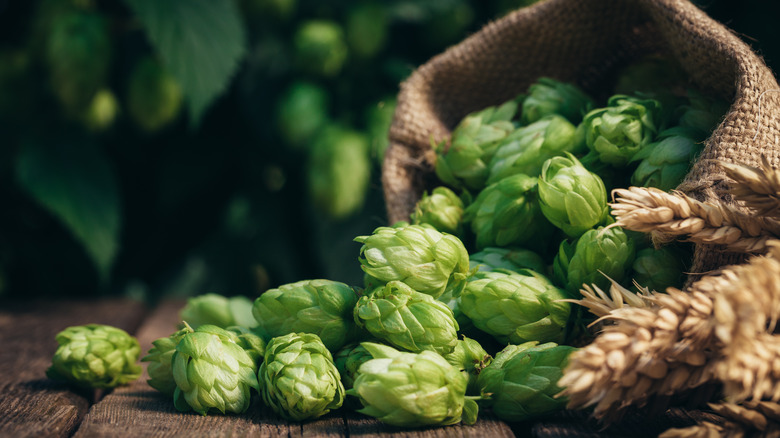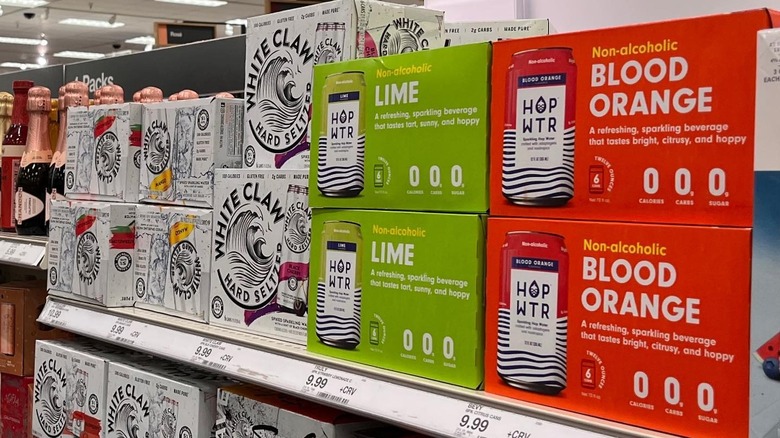What Is Hop Water, And Is It Considered Alcohol?
Hop water is having a bit of a moment. Big beer companies like Sierra Nevada and Lagunitas are making the stuff in addition to tons of smaller brewers. Cans and bottles of hop water also show up on store shelves right beside their beer and seltzer counterparts. But what exactly is hop water?
Hops – the flowering buds of the hop plant — are actually used in every single beer that's produced, from stouts and lagers to sours. Hops are perhaps best known, however, for being a key ingredient in India Pale Ales (IPAs).
The buds were originally added to beer as a preservative to help it stay fresher longer. While they still serve that purpose, they also add a bitter flavor to the beer that can help balance the sweetness of malt used in brewing and make for more flavorsome suds. Although beer is the most common use for hops, you can still enjoy them if you eschew the brew and opt for hop water, aka water flavored with hops.
How hop water is made
Hop water is simply carbonated water that has had hops added to it. While the flavor might remind you of your favorite beer, the drink has more in common with your favorite soda.
Unlike beer, which calls for adding hops during fermentation, hops are added to hop water through an infusion process after the beverage itself (in this case, carbonated water) is already made. The process, called "dry hopping" is also sometimes done to beer after its been brewed to add even more hop flavor. Essentially, hops are added to the carbonated water to impart flavor, just like syrup is added to carbonated water to make Pepsi or Coke.
While there are more than 140 different kinds of hops out there, some of the most popular ones include Cascade, Citra, and Mosaic. The flavor the hops leave behind is reminiscent of an IPA, however, the hops don't contain any alcohol. Unlike hard seltzers, which are malt beverages that are fermented like beer, hop water is merely carbonated so it's also naturally nonalcoholic. While some hop waters are flavored, the choice of hops used in the infusion usually determines the product's taste. Depending on the variety, the buds can have floral, citrusy, woody, or even menthol notes.
What are the potential benefits of drinking hop water?
While you're not likely to get prescribed daily hop water by your doctor just yet, drinking some might have positive effects on your health. For instance, since hop water is naturally alcohol- and gluten-free, one of its biggest benefits is it can provide you with an experience reminiscent of drinking a beer without any of the negative health effects you might get from consuming one (or multiple). Additionally, hops appear to have mild sedative properties that could help you get to sleep at night a little easier. They've also been studied as a potential treatment for depression.
For older women, the phytoestrogen in hops is said to mimic the activity of female estrogen and is used by those going through menopause to aid in overcoming some of the symptoms of estrogen deficiency, like hot flashes. Xanthohumol, a flavonoid found in hops, is thought to help relax blood vessels and improve circulation, something that could help with cardiovascular disease. It has also been studied for its seeming inhibition of cancer cells, making it a potential tool in cancer prevention.
That's right, drinking hop water might actually be good for you. When your thirst needs quenching with something nonalcoholic yet full of hoppy flavor, the health-minded, beer-adjacent beverage could be worth considering.


